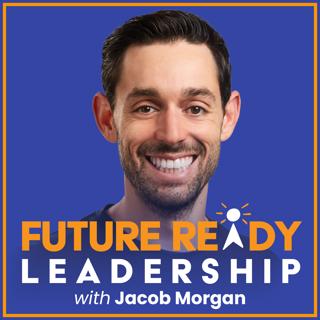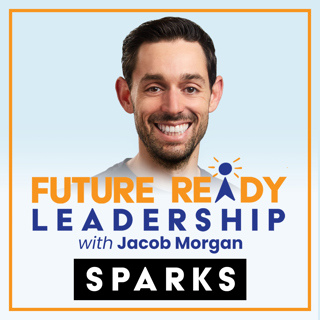
Marriott’s CHRO on Tech, Humanity, and Building a Future-Ready Workforce
What does it take to lead 800,000 employees across nearly 10,000 hotels into the future of work? In this episode of Future Ready Leadership, I speak with Ty Breland, CHRO of Marriott International, about how the company is building a workforce strategy that is tech-enabled but human-centered. Ty explains why technology should automate tasks but create more space for authentic human connection, how Marriott is using AI and workforce analytics to inform smarter decisions, and why wellbeing must now include financial and mental resilience alongside physical health. We also explore why leaders need to shift from annual surveys to real-time listening if they want employees to feel genuinely heard, how Marriott develops leaders from the frontline to the executive suite, and why Ty reframes change management as “change acceleration,” built on alignment, healthy debate, and agility. ________________ Start your day with the world’s top leaders by joining thousands of others at Great Leadership on Substack. Just enter your email: https://greatleadership.substack.com/
22 Sep 56min

Sparks: Make Work More Human: Breaking Assumptions About Work and How Employee Experience Can Make or Break Your Workforce
Work is supposed to be human, but too often it feels like the opposite. For decades, we’ve built organizations on outdated assumptions: managers as “slave drivers,” employees as “cogs,” and work itself as “drudgery.” No wonder so many people feel disconnected. In today’s Leadership Spark, I break down what employee experience really means and why it’s the foundation of the future of work. We start by unpacking the basic concept of “experience” itself, how it shapes our memories, and why those memories define the relationships employees want, or don’t want, to have with their organizations. From there, we explore the flawed assumptions we’ve built work on, and what it takes to shift from a model of utility, where people need to work, to one of experience, where people want to show up. The future of work isn’t about cake, ping-pong tables, or corporate slogans. It’s about designing organizations where humanity comes first. ________________ Start your day with the world’s top leaders by joining thousands of others at Great Leadership on Substack. Just enter your email: https://greatleadership.substack.com/
19 Sep 10min

Patrick Lencioni Shares What Separates Great Leaders From the Rest
Leadership may come with titles, pay, and freedom, but it also demands sacrifice, and too often, leaders forget this truth. When they do, organizations slip into coddling cultures, unclear values, and employees unprepared for the realities of work. In this episode, Patrick Lencioni, CEO of The Table Group and bestselling author of The Five Dysfunctions of a Team and Working Genius, breaks down what leadership really requires and why so many organizations get it wrong. We explore why true leadership is rooted in service, clarity, and accountability, not perks or comfort, and caution against the dangers of companies trying to be “everything to everyone.” We also explore the balance between inclusion and responsibility, the widespread misuse of psychological safety, and how overemphasizing well-being can unintentionally weaken resilience. This conversation is a reminder that leaders must be brutally clear about values, hire for humility, hunger, and smarts, and embrace discomfort as the foundation for growth and long-term success. ________________ Start your day with the world’s top leaders by joining thousands of others at Great Leadership on Substack. Just enter your email: https://greatleadership.substack.com/
15 Sep 53min

Sparks: 8 Attributes You Need to Be a Vulnerable Leader (According to Over 100 CEOs)
What makes vulnerability in leadership powerful, but also dangerous? Leaders often confuse vulnerability with simply admitting mistakes or showing emotions. But without the right foundation, being “open” can backfire, leaving you looking weak or incompetent instead of inspiring trust. In today’s Leadership Spark, the spotlight is on the eight attributes of vulnerable leaders, distilled from my conversations with over 100 global CEOs. The discussion reveals that vulnerability on its own isn’t enough. It has to be paired with strong leadership qualities. We’ll unpack the three crucial attributes leaders need, such as competence, self-confidence, and motivation. You’ll hear real-world stories from failed $150M bets to CEOs battling panic attacks that show how uncomfortable but necessary vulnerability is. ________________ Start your day with the world’s top leaders by joining thousands of others at Great Leadership on Substack. Just enter your email: https://greatleadership.substack.com/
12 Sep 14min

What Mercer’s CEO Reveals About Work Ethic, Cultural Trends, and the Future of Work
What does it really take to reach the top of an organization? Beyond the glossy titles and corner offices lies a culture of sacrifice, long hours, and relentless client demands that shape modern leadership. In this episode, we sit down with Pat Tomlinson, CEO of Mercer, to explore the realities of work culture, the growing “996” trend of long hours, and the sacrifices it takes to rise to senior leadership. Pat shares candid reflections on his own work ethic and why hard work, visibility, and flexibility remain cornerstones for career growth, particularly in professional services. From there, the conversation expands into major workplace shifts—declining birth rates, longevity risk, and the mounting pressures on healthcare and retirement systems. We also discuss the war for talent, the evolving role of employee experience and wellness programs, and the balance between organizational support and individual accountability. Finally, we explore AI’s impact on work, why productivity gains require redesigning jobs rather than bolting on technology, and the cultural challenges leaders face in adopting these tools. ________________ Start your day with the world’s top leaders by joining thousands of others at Great Leadership on Substack. Just enter your email: https://greatleadership.substack.com/
8 Sep 57min

Sparks: Humans, Not Tools: How Employee Experience Can Unlock Engagement and Bring Humanity Back to the Workplace
We often talk about employee engagement, but before that comes something deeper: experience itself. Just like we invest our own time and money into personal experiences that create lasting memories, employees evaluate their organizations through the experiences they have at work. The problem? For over a century, companies have designed work as if humans were robots—linear, rigid, process-driven, and void of humanity. From definitions of “manager” as “slave driver” to “employee” as “cog,” the very language of work reveals how broken the system has been. But times have changed. In today's Leadership Spark, we'll unpack the true meaning of experience at work and why it’s become the defining factor of the future workplace. If organizations want to attract, retain, and inspire talent, they must redesign around humanity, not utility. This episode explores why experience is the missing link between engagement and performance, and how leaders can bring humanity back to work. ________________ Start your day with the world’s top leaders by joining thousands of others at Great Leadership on Substack. Just enter your email: https://greatleadership.substack.com/
5 Sep 9min

Is The Future of Work Ready for AI? Balancing AI’s Potential and Risks with GoTo’s Chief Commercial Officer
AI is shaping the future of work, no doubt, but are organizations truly ready to harness its full potential? Beyond the hype, leaders are grappling with challenges around AI adoption, cultural resistance, and the fear of losing human judgment in the process. What do leaders need to know about balancing AI’s promise with its pitfalls? In this episode, Peter Mahoney, Chief Commercial Officer at GoTo (formerly LogMeIn), reflects on decades of technology transformation and what it reveals about today’s AI moment. We explore why AI feels both overhyped and underutilized, the gap between IT leaders and employees, and how workplace culture influences adoption. Peter highlights where AI already delivers real productivity gains—from virtual assistants enhancing customer experience to tools that accelerate workflow integration and employee training. At the same time, he warns about the risks of over-reliance, AI limitations, and the need for leaders to protect critical thinking in their organizations. You’ll gain a clear view of how leaders can use AI responsibly to innovate, protect culture, and guide the future of work. ________________ Start your day with the world’s top leaders by joining thousands of others at Great Leadership on Substack. Just enter your email: https://greatleadership.substack.com/
1 Sep 1h

Sparks: The Global Citizen Mindset: How Leaders Should Learn to Break Beyond and Expand their Borders
What if your leadership skills were truly borderless? Could you step into any culture, any team, anywhere in the world—and still thrive? That’s the challenge and opportunity of developing a Global Citizen mindset, one of the most crucial traits for leaders today. In today’s Leadership Spark, I share why the Global Citizen mindset is a non-negotiable skill for modern leaders. I tell the story of a remarkable CEO who defied cultural limitations in Morocco, built her career across multiple countries, and earned the nickname “Water Lady” for brokering a major deal between Saudi Arabia and the U.S. We explore how leading in different cultures teaches unique lessons—like patience in Japan or entrepreneurship in the U.S.—and why cultural blind spots, such as Disney’s failed “Euro Disney” launch, can sink even the strongest brands. You can’t lead a world-sized organization without a world-sized mindset. Check out what it means to build this mindset in this episode. ________________ Start your day with the world’s top leaders by joining thousands of others at Great Leadership on Substack. Just enter your email: https://greatleadership.substack.com/
29 Aug 5min






















